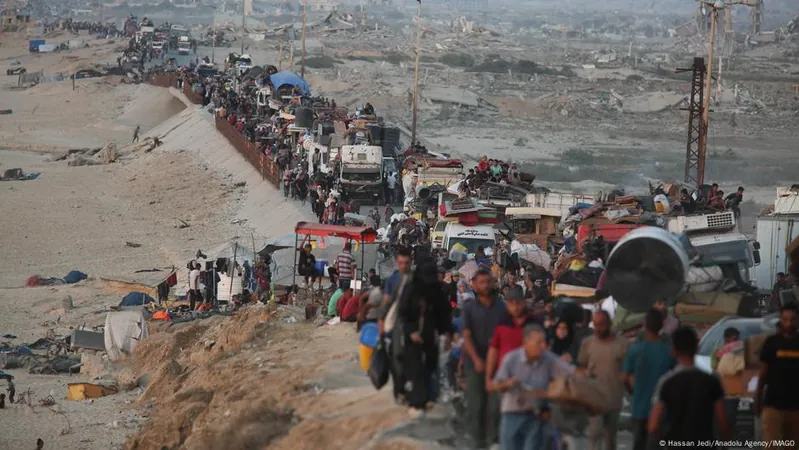
Is Recognition of Palestine the Key to Lasting Peace? Here's What You Need to Know!
2025-09-21
Author: Jessica Wong
A Pivotal UN Summit in New York
This Monday, all eyes will be on the UN General Assembly in New York for a significant summit addressing the ongoing war in the Gaza Strip. This gathering represents a critical moment in a diplomatic initiative spearheaded by France and Saudi Arabia, aiming to revive the long-elusive two-state solution—where Israelis and Palestinians coexist peacefully.
Growing Global Support for Palestinian Recognition
Several nations, including France, Canada, the UK, Belgium, Australia, Luxembourg, and Malta, are set to join the ranks of over 145 countries recognizing Palestine as a state. This momentum follows the devastating military campaign in Gaza, which has reportedly claimed over 65,000 lives, although international estimates suggest the toll may be even greater. A recent UN report has ignited accusations of genocide against Israel, intensifying the urgency for dialogue.
The United States and Israel Push Back
In stark contrast, Israel and its strong ally, the United States, have firmly rejected the UN's findings and any moves toward recognition of a Palestinian state. They argue that such actions would merely reward terrorism following the deadly October 7, 2023, Hamas attacks that led to nearly 1,200 Israeli casualties and triggered Israel's military response in Gaza.
Symbolism vs. Action: The Debate Intensifies
Despite the call for recognition, critics argue that without tangible actions, these gestures fall flat. Ines Abdel Razek from the Palestine Institute for Public Diplomacy pointedly noted that symbolic moves leave Palestinians caught in a widening gap between their realities and international performance. Guardian columnist Owen Jones echoed this sentiment, labeling actions against Israel as mere performative gestures.
What Happens Next?
Concerns loom regarding how the Israeli government will respond to these recognitions. Richard Gowan from the International Crisis Group warns that Prime Minister Benjamin Netanyahu might retaliate with bold plans to annex Palestinian territories, undermining any progress.
Can Statehood Bring Lasting Peace?
Experts largely agree that simple recognition won't halt the violence in Gaza. Columnist Gideon Levy argues that recognition is superficial, providing no real remedy to the ongoing humanitarian crisis. International law obligates nations to intervene against genocide, regardless of statehood status.
A Leap Towards Diplomatic Upgrade
However, recognizing Palestine could bolster their stance in international negotiations, as noted by analysts. Palestinian leaders eventually seek to accede to the Geneva Conventions, and the formal recognition could enhance their bargaining power on the global stage.
Symbolic but Significant
While the recognition may seem largely symbolic, it carries profound implications, particularly from prominent nations like France and the UK. It reflects an important affirmation of Palestinian rights and self-determination amidst ongoing occupation.
Action Required Alongside Recognition
The EU's foreign policy chief has urged member states to consider punitive measures against Israel, such as increasing tariffs and imposing sanctions on Israeli settlers. This suggests a significant shift in policy, as countries like Italy reconsider their previous stances.
The Road Ahead
Experts indicate that the current climate of public opinion is transforming the conversation around recognition and action. The trajectory is clear: while immediate change may be elusive, the ongoing dialogue and recognition may lay the groundwork for future peace efforts.

 Brasil (PT)
Brasil (PT)
 Canada (EN)
Canada (EN)
 Chile (ES)
Chile (ES)
 Česko (CS)
Česko (CS)
 대한민국 (KO)
대한민국 (KO)
 España (ES)
España (ES)
 France (FR)
France (FR)
 Hong Kong (EN)
Hong Kong (EN)
 Italia (IT)
Italia (IT)
 日本 (JA)
日本 (JA)
 Magyarország (HU)
Magyarország (HU)
 Norge (NO)
Norge (NO)
 Polska (PL)
Polska (PL)
 Schweiz (DE)
Schweiz (DE)
 Singapore (EN)
Singapore (EN)
 Sverige (SV)
Sverige (SV)
 Suomi (FI)
Suomi (FI)
 Türkiye (TR)
Türkiye (TR)
 الإمارات العربية المتحدة (AR)
الإمارات العربية المتحدة (AR)